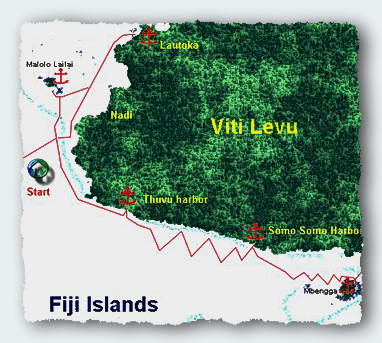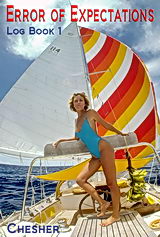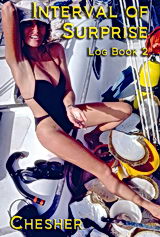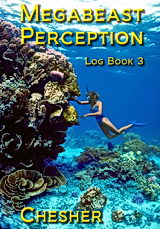Cruising Fiji

We are harmonic waves of communications
Three AM. It's Freddy's watch, but I'll let her sleep a little longer. I wonder where we are? We should be getting to Fiji around dawn, but my sun fix yesterday might have been off by as much as ten miles. There might be currents we don't know about this close to the island. What happens if we reach the outer reefs of Fiji before the sun appears? Right, we crash and sink. This thought gives me a spurt of adrenalin so I stand up, rub my eyes, and go forward.
I stand right in the bow peering into the cool night. The waxing moon is behind us, but still high in the sky so it's fairly bright out. A dark mass ahead on the horizon could be a cloud-bank or it could be an island. If it's an island, we are in trouble. I hang on to the forestay, feeling the headsail quiver in the wind, Moira's bow thrusting through the waves, and the salty wind stinging my eyes. In a worst case scenario, we are about to come crashing into the western reefs of Fiji. So I stare into the darkness, looking for a line of white surf. If I see it, I'll race aft, cut off the autopilot and fall off the wind.
I don't see anything out there.
Freddy joins me on the foredeck at dawn. Fiji emerges from the night sky, backlit by a tangerine sun. By the time I figure out exactly where we are on the chart, I can see the broken lighthouse marking the pass into the broad lagoon on the west side of Fiji. We are exactly on course. Another successful landfall.
The wind is almost behind us as we approach the pass. We are trucking at 8 knots. The wind gusts and I compensate with the wheel, keeping Moira headed directly towards the upwind side of the pass. She's heeled over 20 degrees and ...
"Fish, A fish!" Freddy shouts. I glance aft. Sure enough, our trolling line strains under the load of a catch. Not much time before we are in the pass.
Freddy takes the wheel and I run aft, put on my gloves, and begin to haul it in. Our speed makes the fish, a tuna, surf behind the Moira, skittering along on the surface of Sea. It offers practically no resistance and I pull it in quickly. It's a plump tuna: 15 kilograms of round blue and silver yummy yellowfin. Walter cat winds around my legs as I subdue the fish and kill it with a knife thrust to the brain.
"Better hurry," Freddy calls, "We're coming in."
The reef is close, big white breakers churn just off to starboard. Ahead the pass is clearly visible in the long thread of coral and foam. "You watch the fish, Walter, I'll cut him up when we get through the pass."
I stand in the bow to look out for hidden shoals and give Freddy hand signals on which way to steer - largely unnecessary since the pass is big enough for large ships and clear of hazards. In minutes we are inside, slicing through the flat calm lagoon behind the reef. Freddy steers up the coast while I return to Walter the Cat and his fish.
Fiji is a complex group of islands shaped like a giant fiddler crab, facing north. Viti Levu is the carapace, the biggest island with high, spiny mountains in the center and low undulating hills in the west. Vanua Levu is the big fiddle claw of the crab and its smaller, left arm, is the Mamanutha and Yasawa Island groups. The left arm shelters the shallow, nutrient rich Bligh Water Lagoon. The crab lurks behind the reefs and islands of the Lau group to the east. We sail up the west coast of the crab carapace.
Flat coastal land slides past in the morning sunlight. I can see extensive sugarcane farms on shore. I look up at the island from time to time as Walter and I cut up the fish, me slicing, him tasting to be sure it is OK. Off to our port I see Malololailai and the tops of a few of the Mamanutha Islands.
"That where we are headed?" Freddy asks as I hand her the tub filled with tuna fillets.
"That peak right there must be where the resort is." I point at what I suspect is Malololailai. First we have to go to Lautoka, clear customs and immigration, and get some supplies. Then we head back to Dick's Place on Malololailai to join Louis and George.
Lautoka is a long way in from the reef. It is lunchtime when we anchor in the big commercial port. A fire burns in the sugarcane fields south of the port and sooty smoke settles like black snow all around us. After the farmers harvest the sugarcane crop, they burn the fields. The Australians do it in Cairns, too. They say it kills rats and snakes. There are no snakes in Fiji.
I stand looking at the smoking land. "What a mess. They should rename this place Smoketoka." It's actually a very destructive practice as it destroys the fabric of the soil. It would be better if they plowed the waste under to help rebuild the soil. Or better yet, use the left over sugar cane for making paper.
"Yutch" Freddy groans, watching the soot settle like black snowflakes on Moira's white decks.
Clearing in
The Customs Office is on the ground floor of a giant warehouse on the commercial wharf. Ten Indians, all in uniform, mill about actively doing nothing while Freddy and I sit on a bench and await their attention. Someone brings in a galvanized bucket with muddy looking water in it and a half coconut shell. The men gather around the bucket and slurp the muddy water.
"Must be Kava," I whisper to Freddy. Kava is the Fijian National Drug Drink. It is supposed to make you feel laid back and sociable. The native Fijians have an elaborate ceremony for drinking it. But the Hindus drink it like Coffee. One man noisily smacks his lips and claps his hands three times after he finishes his shot. Without looking at me directly, the man refills the coconut shell and comes over and hands it to me. Louis told me it is terribly impolite to refuse to drink Kava when it is offered.
"Don't you dare drink that shit," Freddy hisses as I do my social duty and slobber the yuckky stuff into my mouth. It not only looks like muddy water, it tastes like muddy water. My mouth goes numb. I grin and smack my lips and hand the cup back to the custom's officer who has still not looked directly at me.
Finally, the Officer in Charge sits down behind his desk and shuffles some papers. They are now, I suppose, laid back and feeling sociable. We are noticed, allowed to come into existence, and with luck into Fiji as well.
Freddy, the official captain of Moira, hands them our port clearance from Noumea, crew list, and passports. In turn, the round faced officer hands her a stack of forms to fill out. I examine the floor, the ceiling, the windows, the posters about dangerous plants and animals (Marijuana and Rhinoceros Beetles, African Land Snails) and contemplate drooling a little; both for effect and to get the taste of the kava out of my mouth.
Whenever I try to deal with customs and immigration officials there is always an unannounced macho contest. I have tried all sorts of postures with them but it's always the same. If I am meek as a cockroach, they treat me like a wounded cockroach. If I am my normal charming self, they treat me like a healthy cockroach. If I am macho, they treat me like a dangerous cockroach. Maybe it's something chemical about me. They just don't like seeing me walk in the door. But Freddy is entirely different.
They don't know what to do about Freddy. She's little, blonde, cute, but very businesslike. She even wears a little two-piece gleaming white captain's outfit. On her it looks great. In the islands (and also in India), men are men and women are shit. A man can happily beat up his lady and everyone will think this is splendid; normal and healthy. Most of the women in the lives of these Indian officials play an elaborate dominance-submission game.
Freddy does not. She's got a hard business look behind that cute exterior. The officials don't know exactly how to handle this. Their only experience with women with that kind of look is their mother. Mothers, unlike wives, are on the high end of the dominance pecking order when it comes to little boys. Maybe, in their limited repertoire of games island men play, there is only the wife/girl-friend gambit and the "OK, Mom" gambit.
Anyway, Freddy has them stick to business and they treat us fairly and quickly while I sit there looking like a candidate for the Special Olympics. Dumb and Confused. Not quite drooling. Whenever the officer looks at me I stare at the floor and slump my shoulders down. The body language tells him I am no threat to his masculinity. He puffs up a bit and ignores me again.
All this deflating posture is really not very hard to do. I've been up since midnight, bouncing around in the surf, hauling in fish, chewing my fingernails as we looked for possible hidden shoals on the trip up the coast, stowing away the sails, putting the Zodiac in the water, mounting the outboard and so on. On top of that, the dangerous drug Kava has worked its way into my blood and I feel terrible. My chest feels tight, I'm sweating. It feels remarkably like a heart attack. Great buzz. I am on the verge of passing out when everyone stands up, the clearance done.
Bank Robbery
Out in the sunshine, free again, off to see Lautoka. The city is a fair hike from the wharf. We would like to take a taxi, but have no Fiji currency yet. So we walk. First stop the bank.
"God, that kava stuff is dreck, I don't care about social customs. I'm never going to touch that crap again." We walk down towards the sugar mill.
"You were crazy to drink it. Who knows what creepy-crawlies were swimming around in that bucket?" We turn down a sidewalk bordering a highway overhung with flowering flame trees, smelling the sticky, spicy aroma of cooking sugar and curry, glancing at the mix of brightly dressed Indians and Fijians in the cars and walking along the street.
"Louis told me kava has some kind of antibiotic effect. It's supposed to kill bacteria and protozoans in the water." A miniature locomotive followed by small, open boxcars filled with cut sugarcane chugs across the street ahead of us, headed for the sugar mill.
"You're crazy to drink it and crazy to believe Louis. You'd better take a couple of quinine tablets when we get back just in case." We arrive at the Bank of New South Wales on the outskirts of the main town. It is a busy little place. Virtually everyone behind the counter in the bank is an Indian.
Louis explained the Indians run all the businesses and hold almost all the government bureaucratic posts. The Indians were imported by the English sugar plantation owners because the Fijians were unreliable workers. Today, the Indian population rivals the native Fijians. To prevent the Indians from gaining complete control of the country, the English set up a highly discriminatory constitution. The Indians are not allowed to own land. They must rent land from the Fijians. The result of this interesting arrangement is that the Indians do all the work while the Fijians lay back and collect the rent.
The money exchange window is the last one on the left. Not much of a line. We have no idea what the rate of exchange is for our Australian travellers checks. I look around, but don't see the usual board giving exchange rates. Never mind. I give the sarong-wrapped, attractive Indian girl a $100 travellers check and she hands over a wad of colorful Fiji dollars. I count it. $86 Fiji dollars.
"Damn," I gripe to Freddy as we walk out, counting the dollars again, "That's a miserable rate of exchange."
Lautoka is a carefully unplanned, sprawling nest of stores and restaurants. The vegetable market is on the far side from the wharf so we amble towards it through the stores, generally taking stock and figuring where to go to buy what. I look at hardware stores, Freddy looks at food and clothing stores. We both look at jewelry stores and both ignore the beggars.
"What the hell are they begging for?" hisses Freddy as a little old lady pleads for a dollar. "Fiji gets enough aid money to feed them all ten times over." The beggar lady is plump and healthy looking. She has taken her dentures out of her mouth to plead with us. After we pass by I glance back and see her slip her teeth back into her mouth.
"It's a Hindu custom," I observe dryly, taking a newspaper from a little Indian boy and handing him a coin. We stop in a small store and buy a couple of cokes. As we drink, I look over the stories of the day. My eye catches the posting for the exchange rates.
"Son of a Bitch!" I shout. "The bank robbed us!"
"What?"
"We should have gotten $96, not $86 for $100 Australian. I'm going back right now." I take the paper and rush back up the street, Freddy trailing along behind me. I storm into the bank.
"I want to see the manager," I am smoldering.
Eventually, after much heated negotiation, I get to see his Majesty the Manager, a dapper little Indian, dressed in a hand tailored silk suit. I fume out my story. The manager is horrified. How can this be? Off we go to confront the villainous teller. The manager is flanked by two assistants. They speak to the young Indian girl in the orange sarong. She does not look very interested in all this. She closes her window while the two assistants examine the contents of the cash drawer.
"Ahhh," beams the manager, "We have made a complete check and are happy to say you must have made an error. The teller could not have given you $86. She must have given you $96 or there would be an excess of $10 in her cash drawer."
"Yeah, well maybe the extra $10 is in her silk drawers," I snap. "She gave me $86. She robbed me. You damn well know she did, too. It wouldn't take a genius for her to see I am dead on my feet and a total stranger who wouldn't know what the exchange rate is. She probably robs every yachtie who staggers in here."
"Really sir, I'm sure there was a mistake, but her only mistake was not giving you a proper receipt." The whole staff of the bank is looking on, ignoring the customers, who seem to be enjoying all this action.
"How come you don't post the exchange rates like every other bank?" I demand.
"Well we do, the board is just there," the manager points to it.
"Great, how the hell can anyone see that? It's on the office side of the wall, totally impossible to see from the money exchange counter. You probably get a cut."
The manager has gone from impatient to weary to spaced and finally shrugs and wanders off leaving me lecturing to the customers about the ways banks rip off the public. Freddy rescues everyone by simply dragging me out the door.
"From now on, when we go someplace, we buy their damn funny money before we leave. Get a cashier's check in the country's currency for what we estimate we'll need and cash it when we get there."
"OK," she says, leading me back to Moira.
Musket Cove
There
are 22 boats anchored in the small round cove
- Musket Cove - sheltered by the lumpy islands
of Malolo and Malololailai. A series of lagoon
reefs protect the southwest border of the
bay. It is relatively secure in winds from
any direction. Although Malolo is the bigger
island, all the action is on Malololailai.
There are two resorts there, catering mostly
to Australian tourists. Dick's Place sprawls
to the north of the small private airport.
Plantation Resort is to the south. Plantation
has the best beach and is the bigger and more
luxurious of the two resorts. But the people
from the yachts go to Dick's place: a series
of little cabins radiating out from a tropical
looking restaurant and bar.
Dick Smith, an Australian, was once a yachtie, himself. He and his wife Carol came to Fiji aboard their yacht back in the sixties. He somehow managed to buy the island and over the years has built both resorts. He sold Plantation but continues to run his own little place. Dick still has a soft spot for yachts. He formed the Musket Cove Yacht Club. For one dollar, a yacht becomes a life member. The name of the yacht is carved in the heavy wood beams of the bar and the captain and crew get a special rate on the thursday night BBQ feast. They also hold mail for passing yachts.
So Malololailai is a major center for cruising yachts. Nearly everybody stops here. I can see U.S, Australian, New Zealand, German, and French flags flying from the yachts around us. Louis' Dragon is anchored right next to Moira. Just like in Noumea.
Louis has hardly said hello to us. He's got a thousand little projects going and is always rushing here and there in his little aluminum skiff. Everyone calls him The Commodore. This is his stomping ground.
It's always fun to arrive in a new port. New people to meet, new sights to see. I like the resort atmosphere. I like the friendly yachting community. I like the whole scene. Freddy and I spend the day wandering around the island, walking the tide flats, holding hands.
It's Saturday night, the moon floats high over the resort and tropical music blares out across the harbor from Plantation's nightclub. Freddy and I dress for the evening and skim over to the white sand beach in the Zod. Louis greets us in the bar.
"Hey, here they are!" He announces as we walk in. He puts an arm around Freddy and leads her up to the crowded bar. "Hey guys, this here is Freddy and Rick from Moira. I want you guys to meet Russ and Penny from Lionheart, and this is the Lovely Lucy with Eyes Like Diamonds who is staying with Artie from Wanderlure. This is Rip and Joy from WasaThangi."
Russ and Penny are clean-cut, soft spoken sailors from New Zealand. I noticed Lionheart before because she is anchored just upwind of us. A nice boat. It's clean and neat like Russ and Penny. Lucy with Eyes Like Diamonds has, indeed, spectacular green eyes. Green and deep like quality emeralds. Artie, her boyfriend, is a wonderful little guy who is wearing a T-shirt with a caricature of himself on it. A spinning-eyed, drunk, frizzy haired, bushy bearded 50 year old hippy. But really friendly, easy-going. The kind of guy who doesn't say much: the kind everybody likes. Well, everyone but bureaucrats. His boat, Wanderlure, is a small schooner. Again, the boat looks like Artie.
As we sit down, a troop of Fijian dancers come bounding onto the stage warbling an ancient Fiji War cry. The music shifts from that ugly, ubiquitous, Tropical Resort Quasi-Spanish Muzak (La Bomba) to an interesting drumbeat. The dancers do a Melanesian Stomp. The customers ignore them and suck up the drinks. The moon sails high overhead. This is resort living.
We talk about places we have sailed, interesting characters we have met, problems we have had. We drink Fiji Babies, the bottled Fijian Bitter beer. It's great. I look over at Freddy. She's talking with Penny and Joy about cooking at sea. She's adorable in the soft light, laughing, happy. She sees me looking at her and smiles, touching me with her eyes.
"Shit," Louis moans, looking out at the moon. "Low Tide. I left my dinghy at Dick's Place." There is a broad mud shoal in front of Dick's Place. It dries completely at low tide. Louis will not be able to get his dinghy off for hours.
"I'll run you home," I offer. "We can get your dinghy in the morning. I didn't even notice the tides today. How do you know it's low tide?"
"The moon. See, when the moon is on the horizon it's high tide. When the moon is right overhead, it's low tide. you mean you never noticed that?" Louis grins at me, the Marine Scientist.
I contemplate all the little drawings I've seen depicting the relationship of the tides to the moon. They always show the ocean on Earth pulled up into a tidal bulge under the gravitational pull of the moon. There is also a slight bulge on the opposite side of the planet. This is a general situation, of course, and other conditions - the shape of land masses, embayments, the synergetic effect of the solar gravity - modify the size of the tides and their timing. But out here in these small islands, the tides should reflect the general picture. And when the moon is overhead, it should be high tide or close to it. There might be some lag time - although I can't see why since gravity acts instantly on the oceans - but certainly not a lag time of 6 hours.
I get up and go outside. The moon is right overhead. The tide is dead low. I'll be damned. How can that be? Gravity attracts. It's like the moon was pushing down on Sea. How come I never noticed this until now?
I hear a loud shout and laughter behind me. Louis and the others stagger out onto the beach. Freddy and I pour Louis into the Zod and take him home.



